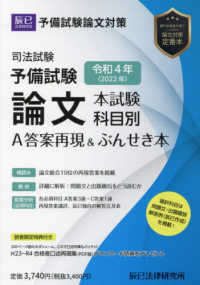基本説明
This book argues : that pharaseology - is important to the study of evaluative language; that modal meaning is expressed through particular phases and not only through modal verbs; and that figurative phrases are used to intensify evaluation.
Full Description
This book applies a set of corpus investigation techniques to the study of evaluation, or stance, or affect, in naturally-occurring discourse. Evaluative language indicates opinions, attitudes, and judgments. It is an important part of activities such as persuading someone that a particular viewpoint is correct, or in constructing knowledge from a different number of theories. This book argues that phraseology--regularities or patterns in language identifiable from corpus studies--is important to the study of evaluative language. It makes a number of more specific arguments: that modal meaning is expressed through particular phrases and not only through modal verbs; that figurative phrases are used to intensify evaluation; and that patterns of use may be exploited to achieve an automatic identification of evaluations. It also builds on the author's previous work in exploring how films and journalism use language and images to build knowledge from ideas.
Contents
1. Evaluative Language, Phraseology and Corpus Linguistics 2. Appraisal, Stance, Evaluation 3. Status in Written Texts and Multi-Modal Text 4. Evaluation, Quantity and Meaning 5. Modal-Like Expressions 6. Corpus Approaches to Investigating Status 7. Grammar Patterns, Local Grammars, and Evaluation 8. Phraseology, Intensity and Density 9. Conclusion




